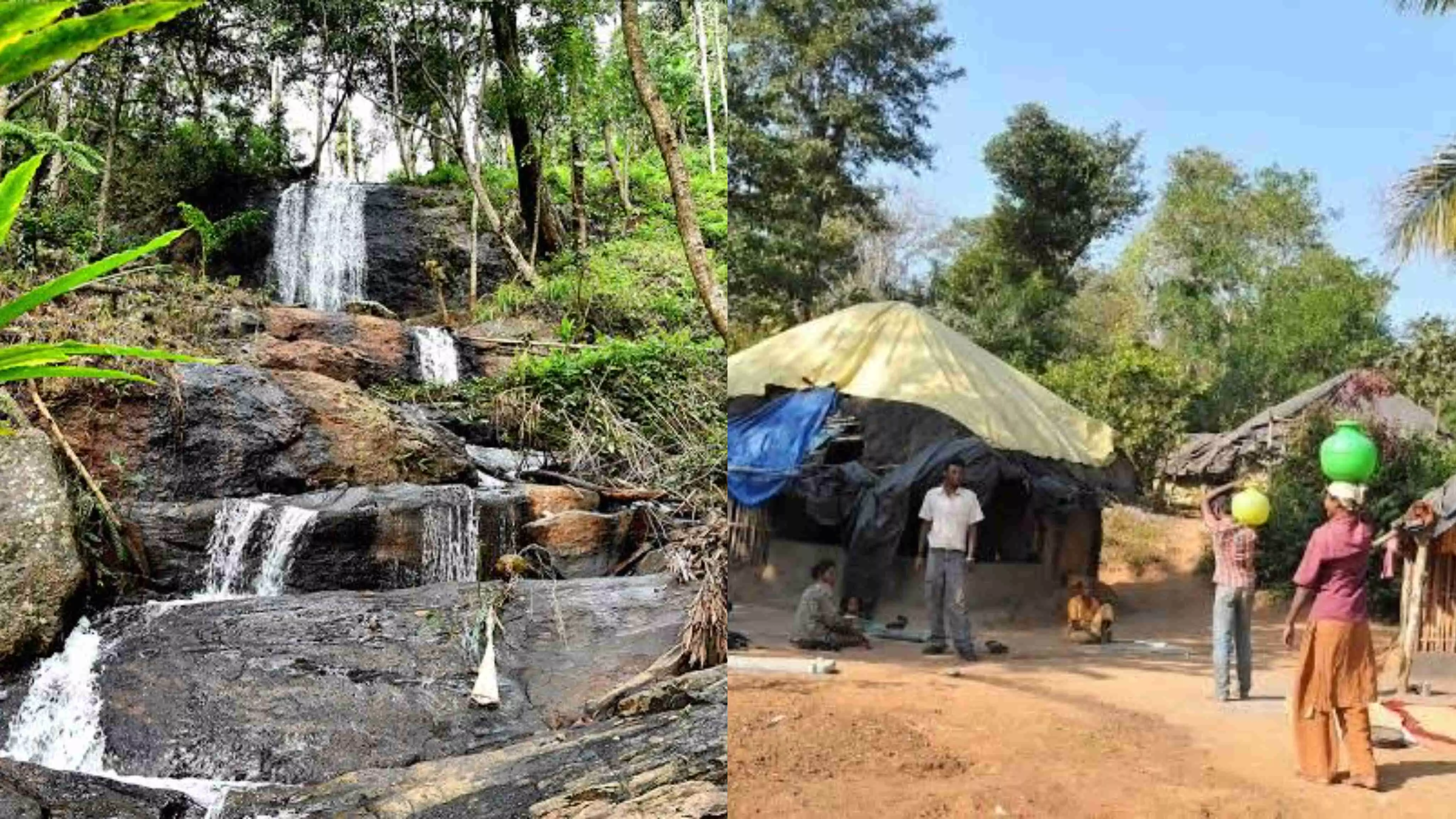Suffering in silence: Over 150 members of Jenu Kuruba tribe face eviction from Karnataka's Karadikallu forests
Since May 5, 2025, Karadikallu has seen a heavy deployment of over 120 forest guards, state police, and members of the Special Tiger Protection Force
By Anoushka Caroline Williams
Representational Image
Hyderabad: For 42-year-old Mallamma, the forest has never been just a place of trees and animals. “This is our home. My parents and grandparents lived here. We gave birth to our children here. Now they tell us to leave again, as if we don’t exist,” she says, standing beside the remains of a dismantled structure—once a menstrual shelter built by the women of the Jenu Kuruba community in Karadikallu Hattur Kollehaadi, deep inside the Nagarahole Tiger Reserve.
Mallamma is among 150 members of the Jenu Kuruba Adivasi tribe facing forced eviction, in what rights groups and legal experts call a blatant violation of the Forest Rights Act (FRA), 2006. The 52 families had returned to reclaim their ancestral land in early May 2025—land they say they were forcibly evicted from in the early 1980s. Their return was met not with dialogue, but with paramilitary presence and administrative threats.
Growing Tensions, Mounting Support
Since May 5, 2025, Karadikallu has seen a heavy deployment of over 120 forest guards, state police, and members of the Special Tiger Protection Force. Sacred sites were razed, access roads were blocked, and threats were issued, despite the community having filed legitimate forest rights claims under the FRA as far back as 2021.
In response, a coalition of 206 socio-environmental groups, lawyers, academics, journalists, and concerned professionals met with Mr. Randeep D, Principal Secretary, Tribal Welfare Department, Karnataka, on 3 June 2025. They submitted a detailed letter urging “immediate and just intervention” in the matter.
Among the signatories were Fridays For Future India, Peoples Union for Civil Liberties, Food Sovereignty Alliance, Community Network Against Protected Areas (CNAPA), Jagrit Adivasi Dalit Sangathan, and India Labour Solidarity (UK-based). Noted individuals, including activist Meera Sanghamitra, lawyer Clifton D’Rozario, writer Yuvan Aves, and climate defender Disha A Ravi, also endorsed the representation.
Academics from institutions such as IIT Madras, National Law School of India University, and Azim Premji University lent their voices to the collective.
Fabricated Order, Fabricated Justice
The eviction threats intensified after a letter was issued by the Assistant Conservator of Forests, Nagarahole Wildlife Division, on May 8, citing a May 6 High Court order that suspended all FRA-related activities in the area. Upon closer investigation, the letter was found to be fabricated.
The solidarity group called this a “blatant attempt to withhold implementation of FRA 2006”, adding that it amounted to “perjury under criminal law” and also violated Section 3(g) of the SC/ST (Prevention of Atrocities) Act.
“This is not just a bureaucratic error—it is an obstruction of justice,” the letter read, condemning the attempt to mislead a community that has long borne the brunt of displacement and systemic marginalisation.
FRA Claims Ignored, Process Violated
On 22 May 2025, the Sub-Divisional Level Committee (SDLC) rejected 39 of the community’s forest rights claims. However, the rejection itself was unlawful, according to the community.
“The SDLC only plays an advisory role and can direct the Gram Sabha in case more evidence is needed. But it does not have the authority to outrightly reject claims,” said JA Shivu, President of the Karadikallu Forest Rights Committee.
Indeed, the Ministry of Tribal Affairs in Delhi had already intervened earlier with a letter dated 15 May 2025, urging the Karnataka government to take swift action to uphold the rights of the Jenu Kuruba families and correct the “gross infringements.”
Legacy of Displacement
The Jenu Kuruba community has a long and painful history of eviction from Nagarahole, dating back to the 1980s when conservation-led displacement began removing Indigenous populations from what was declared a protected forest. For the families of Karadikallu, their return in May 2025 was a reclaiming of ancestral territory.
“The Forest Department has been lying to the media, saying our FRA claims have been rejected,” members of the haadi said in a public statement. “In reality, it is the Forest Department that has violated due process. They were supposed to respond within three months of our claim submission in 2021. They didn’t.”
Despite submitting memorandums, undergoing a joint verification, and a GPS survey conducted by the Panchayat, Revenue, Forest, and Tribal Welfare Departments, no final recognition of their rights has been issued.
Government Response
Speaking to the delegation on 3 June, Randeep D acknowledged that the SDLC’s rejection of the claims was indeed “a violation of the FRA process.” He assured that the department would look into the matter and raise it further. He also accepted the detailed representation and said he was open to sending a deputation to Karadikallu to engage directly with the community.
What the Solidarity Group Demands
In their letter, the coalition made four key demands:
Immediate recognition and approval of the IFR (Individual Forest Rights), CFR (Community Forest Rights), and CFRR (Community Forest Resource Rights) claims filed by all 52 families of Karadikallu in 2021, based on completed verification processes.
A formal dialogue with the Karadikallu Forest Rights Committee and Nagarahole Adivasi Jammapale Hakku Sthapana Samiti (NAJHSS) to address grievances.
Withdrawal of paramilitary forces and forest department officials from the area to end intimidation.
Unrestricted media access to ensure transparency and public accountability.
“They Want Us to Disappear”
As the situation continues to unfold, the people of Karadikallu wait, watching both the government and the sky. Monsoons are approaching, and with them, the need for shelter, food, and stability grows more urgent.
“They want us to disappear,” says Mallamma, clutching a small bag of seeds meant for planting. “But we’re still here. We have always been here.”